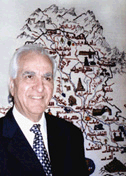Therapeutic Tourism
What are the new horizons for Islamic Tourism? This expression was found on advertisements in certain countries that have achieved significant increases in earnings form tourism. It is an increasingly important topic, and one that deserves discussion.
Mineral water baths and associated physiotherapy treatments These have been well known for a long time in central Europe, especially in Germany and the former Czechoslovakia. Some cities have even been names after mineral water baths, such as Baden Baden, Wiesbaden, and Badhamburg. The word ‘bad’ (pron. baad), is either prefixed or post-fixed to the place name. There is also Carlofifari (Carlsbad) in the Czech Republic, and Bishtani in Slovakia, as well as the city of Baden in Switzerland. Mineral springs are not peculiar to any one country, of
course, but are found all over the world. The countries mentioned, however, are famous having early on discovered the therapeutic and health benefits of these springs, and have, moreover, managed to analyze and develop them, thus cementing their status as primary
destinations for anyone seeking treatment from stress or pain. During the communist era, Czechoslovakia was dependent on its tourism resources, especially the therapeutic baths that it is renowned for, to the extent that there was even a special flight route between Kuwait and the village of Bishtani in order to transport patients in need of treatment to these baths. The trademark of this
particular city is a man breaking his walking stick, which he would have used to lean on, as he emerges from the mineral water treatment. Bishtani participated in the recent Cairo trade fair, MTF, which illustrates the growing importance of therapeutic treatment as a sector within the tourism industry.
Sea water
It is a well known fact that a quarter of the world’s population, at least, visit beaches and resorts in the summer months, especially during holidays, perhaps the first trend in holidaymaking followed ever since. It is therefore crucial that greater attention is paid to this sector, particularly considering the type of life-enhancing – not to mention enjoyable - activity, or activities, visiting the seaside involves. Many countries have thus taken full advantage of their sea water and developed natural treatments from it. These include countries such as Tunisia (on the Mediterranean Sea) and Jordan on the Dead Sea.
The Tunisian Tourist Bulletin has highlighted the importance of sea water and open air ‘beauty therapies’ for the remedy and treatment of many illnesses. In one of its publications, the Bulletin mentions the Alazward Centre as an important centre for treatment that is equipped with the latest in healthcare technology. It houses sea water that is rich in minerals in addition to rare materials that are stated to be similar to the components found in blood.
Those who keenly follow such activities will find hundreds of treatment centres of various types across the world.
"The Tunisian Tourist Bulletin has highlighted the importance of sea water and open air ‘beauty therapies’ for the remedy and treatment of many illnesses. In one of its publications, the Bulletin mentions the Alazward Centre as an important centre for treatment that is equipped with the latest in healthcare technology.
Therapeutic Tourism
This has experienced a particularly wide expansion recently. As mentioned, it is a relatively new and
exciting venture that many entrepreneurs in the tourism industry will no doubt consider worth the risk. Jordan, for example, is trying to attract Arab therapeutic tourism in order to compensate for the lack of ordinary tourism in the country, and in some of the pages of this issue you will find more details relating to this subject.
The industry of “therapeutic treatment”
Developing countries have already recognized the importance of the therapeutic industry, or therapeutic tourism. For example, the Saudi–German Hospital has intensified its various efforts by way of advertisements. Although many people may feel that this campaign is directed at potential customers from Saudi Arabia, I believe it has a wider appeal, and that it must also have an Arab and Asian dimension.
Therapeutic health spas / sanitariums
Lebanon was one of the more advanced countries that instituted therapeutic sanitariums for sufferers of tuberculosis (TB). Good geographical positions were chosen for these health spas / sanitariums, in the plentiful mountainous areas of Lebanon, renowned for their beauty and clean air, in comparison to other Arab cities where air is very hot. These health spas are run by charities, among which are the Catholic Priests Charity, which runs the Bahnas and Hamana health spas. These two, in particular, are known to have the best doctors, and are run to a very high standard, equivalent
to four if not five star hotel grades in terms of cleanliness and personal care for patients.
Some patients stay for long periods, which sometimes might extend to years. Mostly rich people from Arab countries use these health spas / sanitariums, although
treatment charges are not particularly high. TB was, of course, almost entirely eliminated by modern medicine, and there are only few cases of it around, most of
" Lebanon was one of the more advanced countries that instituted therapeutic sanitariums for sufferers of tuberculosis (TB).
Good geographical positions were chosen for these health spas / sanitariums, in the plentiful mountainous areas of Lebanon, renowned for their beauty and clean air, in comparison to other Arab cities where the air is very hot.
them treatable as with other more common diseases. This has forced these health spas/ sanitariums to modernize their treatments and therapeutic programmes in order to
treat other less serious illnesses for local patients.
Examples of underdeveloped health spas in the Arab world contrast with the more well-developed European ones, which have contributed to the development of therapeutic tourism in Europe. We see, for example, many hospitals that cater especially to foreign patients, such as Cromwell Road Hospital in London, as well as others. If we glance at Harley Street, the world-renowned centre for the most famous doctors in Britain, we will see that doctors’ surgeries in this street rent rooms by hours, not days or months. The reception department in these buildings receive calls and organize
appointments for the doctors. The doctor concerned will then arrive at the specified time to examine his / her patients in a room that is especially provided. He / she sends patients for x-rays, analyses and other necessary examinations in the hospitals and laboratories that located in the vicinity.
Other therapeutic health spas
Psychological crises, alcoholic addictions, and other
untreatable diseases and illnesses are on the increase due to the complexities of modern life. And this is by no means exclusive to the economically disadvantaged populations. On the contrary, the rich are the ones who are most at risk of such illnesses. This highlights the need for having specialized and high standard health spas. There are high-level hospitals and health spas for psychological illnesses in Britain such as Priory Hospitals. Psychiatric patients and alcohol addicts are treated
at these centres from all over the world. They visit these hospitals in order to spend a period of medication, which may last for months.
Elderly and Disabled Homes
This is a large sector that has been expanding in Europe. These homes are places where old people who have some savings resort to in order to enjoy the care and company of their peers. For them, this is better than living on their own or with immediate family members, particularly as many old people argue that they do not wish to be a "burden" on family in their twilight years. This type of care has become an independent economic sector. In future issues of Islamic Tourism, I will attempt to highlight aspects of ‘associate tourism’ that can also be developed in addition to therapeutic tourism. There is no doubt that patients who travel to countries and places of
treatment will need to be accompanied by relatives and loved ones, and this also constitutes an important revenue factor in relation to such tourism. Among the most important issues for patients, especially those longer term residents of care homes for the elderly, is entertainment. This entails the need to go on occasional excursions to nearby parks and resorts. The best examples are perhaps found in the United Kingdom where there are many such places of entertainment as well as comfort. As for those who go to mineral bath and physiotherapy treatments at sea resorts and such places, these are tourists who, after undergoing treatment, exercise or swimming, will also want entertainment. Most of the cities in which these facilities are available also have other facilities, such as shopping and entertainment centres.
We would like to take this opportunity to welcome all international health institutions as guests on the pages of this magazine and on our website:
www.islamictourism.com
in order to energize this very important sector, in all its aspects, so that the magazine becomes a link between those seeking such destinations. We will try to assist you in finding out more about the available possibilities, and also facilitate communications in this regard.
Finally, I would like to call upon the ministries of tourism to coordinate their efforts in order to develop therapeutic tourism and highlight it, and also to achieve economic revival for people working in the sector who are – and will - doubtless benefit from it.
May God guide us towards the best of deeds.
|

